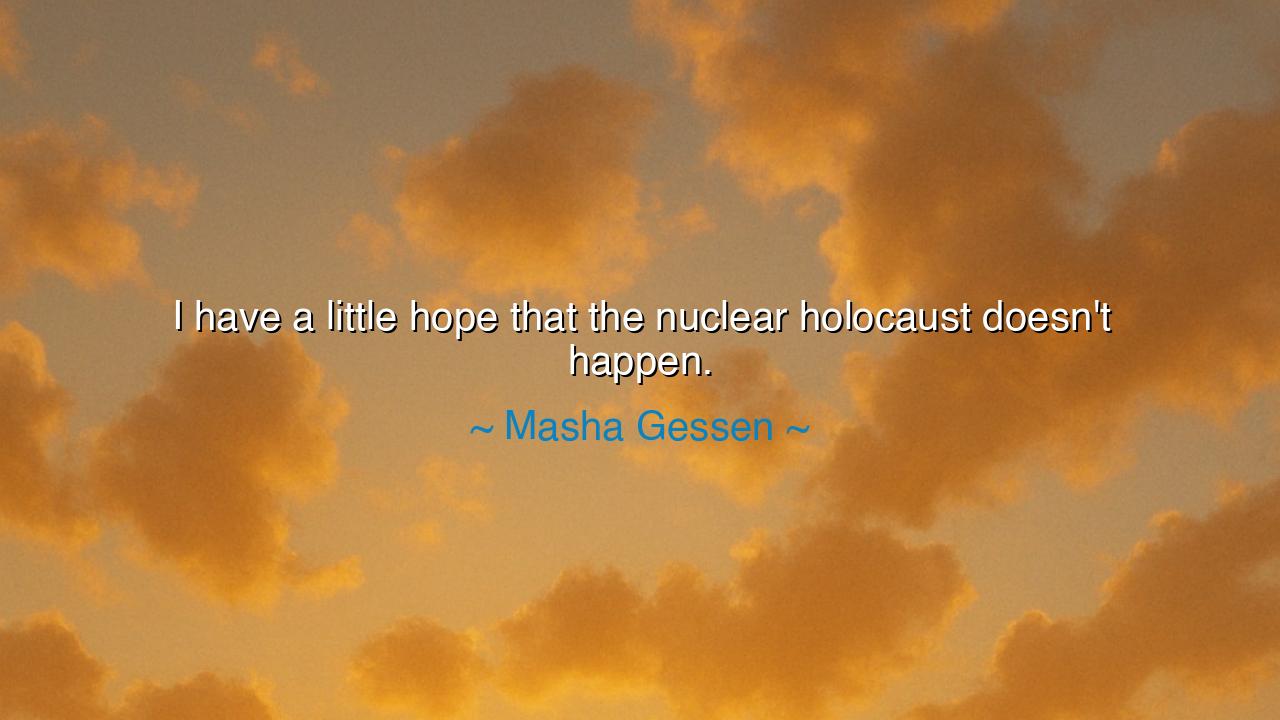
I have a little hope that the nuclear holocaust doesn't happen.






In the solemn words of Masha Gessen, the modern chronicler of truth and tyranny, there glimmers both despair and defiance: “I have a little hope that the nuclear holocaust doesn’t happen.” This is not the loud hope of the naïve nor the blind optimism of the comfortable. It is a fragile hope, born in the shadow of destruction—a flickering flame that persists though surrounded by winds of chaos. To speak such words is to acknowledge the vastness of human folly and yet still refuse to surrender entirely to despair. It is to stand upon the edge of annihilation and whisper, “Still, I believe in life.”
Throughout the ages, humanity has stood often before its own ruin. From the fires of Troy to the ashes of Hiroshima, we have built civilizations upon both wisdom and madness. Gessen’s words belong to this lineage of those who, staring into the abyss, dared to keep hope alive. The nuclear holocaust she invokes is not only a weapon of flesh and fire—it is a symbol of mankind’s darkest potential, the final mirror in which we might behold our extinction. Yet even here, amid the dread of annihilation, Gessen clings to the smallest thread of faith—that somewhere, in some soul, compassion might prevail over destruction.
The ancients, too, knew this delicate balance between despair and endurance. In the story of Pandora, when all the evils of the world escaped her jar—plague, sorrow, deceit, war—one thing remained: Hope. Small, trembling, easily overlooked, yet immortal. It was not a cure, but a companion; not a promise of safety, but a reason to continue. Gessen’s “little hope” is of the same kind. It does not deny the darkness; it exists because of it. The greater the peril, the more precious the hope that survives it.
Consider the tale of the Cuban Missile Crisis in 1962, when the world came closer to destruction than it ever had before. The sky itself seemed to hold its breath as two nations, armed with fire enough to erase humanity, stared each other down. Yet amid that terror, men like Vasili Arkhipov, a Soviet naval officer, acted with quiet restraint. When ordered to launch a nuclear torpedo, he refused—choosing instead to believe that peace was still possible. One man’s hope, however faint, saved the world from catastrophe. Gessen’s words echo this truth: that even the smallest act of faith may stand between life and oblivion.
But her statement is also a lament—a recognition that hope has become a rare and costly thing. In an age where power and greed darken the horizon, to have “a little hope” is itself an act of rebellion. It is not ignorance of the danger, but courage in spite of it. To live with such awareness and still find reason to believe is to embody the endurance of the human spirit—the same spirit that rebuilt cities from rubble, that raised songs from mourning, that planted trees in the shadows of war.
Yet, hope without action is a hollow prayer. The ancients would remind us that faith must be lived. If Gessen’s words are a spark, then we, the living, must guard that spark against the winds. To hope that the nuclear holocaust does not come is to also work for peace, to speak against the madness of power, to nurture empathy where indifference reigns. Hope is not the denial of danger—it is the decision to stand against it.
So, my child of tomorrow, take this lesson: do not let the enormity of the world’s peril steal your hope. Let your hope be humble, yes—but let it endure. Speak peace when others shout war. Build when others destroy. Love when the world turns to fear. Even a little hope can illuminate a great darkness, and history has shown that from the smallest embers of belief, civilizations are reborn.
Thus, remember Masha Gessen’s quiet confession not as despair, but as a testament to the indestructible human will—that even at the threshold of extinction, we are still capable of choosing life. And if you carry even that little hope forward, then perhaps, the end she fears will never come.






AAdministratorAdministrator
Welcome, honored guests. Please leave a comment, we will respond soon